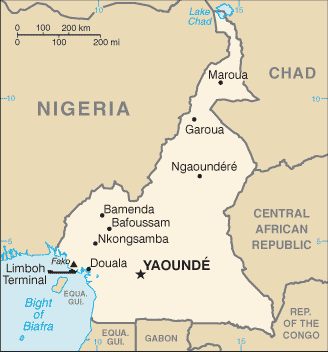 Washington, DC–(ENEWSPF)–August 5, 2015. The Department of State warns U.S. citizens of the high risk of traveling to Cameroon, and urges U.S. citizens to avoid all travel to the North and Far North regions of Cameroon due to the general threat of terrorism, particularly by the extremist terrorist group Boko Haram, murder and kidnappings targeting westerners, and violent criminal activity. Due to the security situation in country, the U.S. embassy has limited ability to provide consular services in remote and rural areas. This replaces the Travel Warning of February 4, 2015 to emphasize the continuing threat of armed attacks, bombings and kidnappings in the Far North region of Cameroon and Boko Haram’s aspirations to extend the threat to other parts of the country.
Washington, DC–(ENEWSPF)–August 5, 2015. The Department of State warns U.S. citizens of the high risk of traveling to Cameroon, and urges U.S. citizens to avoid all travel to the North and Far North regions of Cameroon due to the general threat of terrorism, particularly by the extremist terrorist group Boko Haram, murder and kidnappings targeting westerners, and violent criminal activity. Due to the security situation in country, the U.S. embassy has limited ability to provide consular services in remote and rural areas. This replaces the Travel Warning of February 4, 2015 to emphasize the continuing threat of armed attacks, bombings and kidnappings in the Far North region of Cameroon and Boko Haram’s aspirations to extend the threat to other parts of the country.
The Boko Haram terrorist group is active in the Far North region, and has actively targeted foreign residents, tourists, and government leaders. Boko Haram’s leaders have stated and demonstrated through their actions that they are actively seeking to kidnap westerners, including U.S. citizens traveling to or living in the Far North and North regions of Cameroon. Twenty one foreigners have been reported kidnapped since 2013. The U.S. Embassy continues to maintain restrictions on travel by U.S. official personnel to the North and Far North regions of Cameroon, as well as any travel north of Ngaoundere in the Adamaoua region.
U.S. citizens should exercise extreme caution when traveling within 60 miles/100 kilometers of the border with Nigeria’s Adamawa State in the North and Adamaoua regions of Cameroon, the border area with Chad, and the border areas with the Central African Republic (CAR). Violence, banditry, and military operations in border areas can quickly spill over into Cameroon. Note there are Travel Warnings for neighboring Nigeria, Chad, and CAR. The threat of piracy is present in the waters of the Bakassi peninsula in the Gulf of Guinea.
Criminal activity continues to be a major concern particularly in Yaounde, Douala, and other towns. Burglaries, armed robberies, theft by intimidation, and snatch-and-grab crimes are commonplace in these areas. High unemployment and an under-equipped police force exacerbate the situation. An influx of refugees fleeing conflict in CAR and Nigeria has strained Cameroon’s economy and added population to already crowded urban areas. Road banditry, especially along the eastern border with CAR, is reported periodically.
For further information:
See the State Department’s travel website for the Worldwide Caution, Travel Warnings, Travel Alerts, and Country Specific Information for Cameroon.
Enroll in the Smart Traveler Enrollment Program (STEP).
U.S. citizens who decide to travel to or remain in Cameroon despite this Travel Warning are urged to provide their current contact information and next-of-kin information through STEP.
Contact the U.S. Embassy in Cameroon located on Avenue Rosa Parks close to the Mont Febe Golf Club in Yaounde, at +237 22220-1500 ext. 4341/4023 from 8:00 a.m. to 5:00 p.m. Monday through Thursday and 8:00 a.m. to 12:00 p.m. on Friday. After-hours emergency number for U.S. citizens is +237 22220-1500 ext. 4531.
Call 1-888-407-4747 toll-free in the United States and Canada or 1-202-501-4444 from other countries from 8:00 a.m. to 8:00 p.m. Eastern Standard Time, Monday through Friday (except U.S. federal holidays).
Follow us on Twitter and Facebook.
Source: www.state.gov








